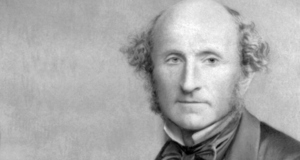On Freedom and Progress: Comparing Marx and Mill
By
2013, Vol. 5 No. 11 | pg. 2/2 | « Unlike Marx the impediment to freedom for Mill is not the bourgeois state, but the masculine state. The masculine state legally supports the subservience of women in private life and deprives women of participation in public life. Because women are denied public duties, they are forced to accept maternal duties as the only viable source of self-sufficiency. However, the law of marriage legally compels women to be dependent on men, making them subservient to them.25 Thus, half of humanity lacks freedom. They cannot freely express, act, or associate. Furthermore, the masculine state does not see the arbitrariness of women’s status, because men think they benefit from women’s subordination. In the private sphere, equal status of women would mean that they would have equal bargaining power in the affairs of marriage and of dowry.26 In the public sphere, it would mean that men would have to compete for opportunities. Thus, they perpetuate the status quo. Evidently, the impediments to freedom are conceptualized differently by both Marx and Mill; however, both share the view of human nature’s need for diversity in ways for self-cultivation. The significance of the bourgeoisie is that they create a society in which the proletariat are reduced to machines with narrow functions. The proletariat are restricted from exploring ways to cultivate their lives as they do not control the object of their labour, and they are therefore denied a fundamental desire of human nature. Similarly, Mill shares the view of the necessity for specialization. As he says “Human nature is not a machine to be built after a model… but a tree, which requires to…develop itself on all sides, according to… the inward forces….”27 Only by allowing diversity in ways of living can happiness be achieved for the greatest number. Thus, both stress the importance of diversity in ways of self-cultivation as fundamental to human nature.Whereas Marx argues that the community helps realize the human need for self-cultivation, Mill supports non-interference in the community. Marx claims that conscious self-cultivation and human productivity alongside another actualizes mankind’s social nature; thus, human nature is the true community of men without the egoism of individuality and the estrangement from fellow men.28 Hence he writes, “Only in community with others has each individual the means of cultivating his gifts in all direction….”29 Evidently, it is within the community that one realizes oneself alongside his fellow men through labour that is for oneself and complementary to others. Conversely, Mill argues that the community must not interfere. Mill articulates that while the community makes freedom possible it can also destroy it through the enforcement of conformity with customs – a form of social coercion. Thus, it must be limited with freedom as non-interference. This is reflected through the harm principle that so long as no harm is done to another, freedom must be respected. The purpose of the harm principle is to allow the development of individuals such that the more developed one becomes, the more resistance to external manipulation by the community can improve. Hence, rather than rely on the classless community to realize self-cultivation, Mill focuses on the capacity of the individual. Another difference is their advocacy for change. For Marx, a classless society will achieve the maximum freedom for all, and the proletariat will be the vehicle for revolution. In a classless society, private property and capital will be abolished and alongside it, class antagonism. The proletariat, being the universal class as its interest is the interest of all will seize control of the modes of production and communize them.30 Bourgeois exploitation cease to exist.31 The proletariat will no longer serve as part of a machine. Instead everyone will become species-being, as upon achieving maximum abundance, no one will labour for another but only for self-cultivation. Hence, capitalism will progress to communism, where freedom will finally be achieved: he is much, because he has little. Since one cannot have revolution against social norms, Mill advocates for reform and reform must happen in the family. Because men consider themselves better off in the status quo, they perpetuate it. However, the practice of inequality within the family is bad training for citizenship in a liberal state.32 Hence, inequality is also bad for men, because they experience the schism of balancing the ideals of equality with the practice of inequality. The state, therefore, must intervene to grant equality within the family.33 Moreover men, rather than the proletariat, must be the vehicle for change. Without men, reform through parliament cannot occur. Since women have no freedom of choice, they must be granted the ability to vote such that they can protect their actions politically.34 Doing so will allow society to maximize happiness, as women gain the ability to contribute to society’s productive forces and the freedom to choose how to live. Furthermore, the schism within men will dissolve, and his character will no longer be self-worshipping.35 Therefore, Mill urges men to reform for the interest of maximizing society’s happiness. The masculine state will have further progressed toward a liberal state when equality for women is attained. Some may argue that another distinction is neglected: the distinction between Marx’s communist state as the end of progress versus Mill’s democratic state as the end of progress. The rationale behind this argument is that since Marx’s conception of struggle is essential to progress and history aims to realize freedom, progress comes to an end when no struggle is necessary as class-antagonism ceases in a communist state; similarly, since the condition of equality between sexes is achieved in a liberal democracy and absolute freedom met for both sexes, progress ends as liberalism is realized. But such a comparison cannot be made. Marx explicitly refrains from commenting on what a communist state looks like in practice.36 Modern interpretations of communism are perversions of Marxism, while pure Marxism has never been realized. Mill does not comment on the end of progress upon achieving equality between the sexes. As contemporary liberal societies suggest, race and ethnicity are also minorities who combat majoritarian norms; hence, progress does not end upon achieving equality for the sexes as there are freedoms for visible minorities to be realized. Therefore, to compare a vision that has yet to actualize with contemporary liberal democracies is unfair. In conclusion, this essay argues that Marx and Mill both have an interest in freedom that shares features including the premise that progress is possible, the view of freedom as an end in itself, and the idea that human nature for self-cultivation must be valued; yet they still reach radically different conclusions. Mill’s argument for gender equality is convincing, but a world in which states intervene in the family is as unimaginable as communism envisioned by Marx. If the state intervenes in the family, does that not contradict the non-interference preached by Mill? Of course, the aggregate of choice is always going to create some coercive norms, such as gender equality, so how can the individual be wholly independent? Marx, on the other hand, acknowledges the social aspect of human nature and reflects that coming together on equal grounds is beneficial to all. Ultimately Marx’s vision of communism is valuable because it is a vision that allows for the critique of contemporary society. Perhaps false-consciousness still plagues us, but at least it allows for the unmasking of the exploitation of contemporary capitalism.37 ReferencesMarx, K. German ideology. 1932. Accessed from: http://www.marxists.org/archive/marx/works/1845/german-ideology/ch01d.htm Marx, K., The Marx-Engels Reader, Second Edition, Edited by Robert C. Tucker. NY: W.W. Norton & Company, 1978. Mill, J.S., The Collected Works of John Stuart Mill, Volume XVIII. 1832. Accessed from: http://oll.libertyfund.org/?option=com_staticxt&staticfile=show.php%3Ftitle=233&chapter=16538&layout=html&Itemid=27 Mill, J.S. The Basic Writings of John Stuart Mill On Liberty, The Subjection of Women & Utilitarianism. NY: Modern Library, 2002. Endnotes1.) Oxford Dictionary, See http://oxforddictionaries.com/definition/english/progress?q=progress. 2.) “Modern industry has converted the little workshop of the patriarchal master into the great factory of the industrial capitalist.” See Marx, K., The Marx-Engels Reader, Second Edition, Edited by Robert C. Tucker. (NY: W.W. Norton & Company, 1978), p.479. And Marx, p. 474. (Unless specified, Marx refers to this book). 3.) “Men are the producers of their conceptions, ideas, etc. – real, active men, as they are conditioned by a definite development of their productive forces and of the intercourse corresponding to these, up to its furthers form.” See Marx, p. 154. 4.) “The materialist doctrine that men are products of circumstances and upbringing, and that, therefore, changed men are products of other circumstances and changed upbringing, forgets that it is men who change circumstances and that it is essential to educate the educator himself.” See Marx, p. 144. 5.) “Philosophy is the head of this emancipation and the proletariat is its heart.” See Marx, p. 64. “The philosophers have only interpreted the world, in various ways; the point, however, is to change it.” See Marx, p. 145. 6.) “It is accordingly on this battle-field, almost solely, that the rights of individual against society have been asserted on board grounds of principle, and the claim of society to exercise authority over dissentients openly controverted. The great writers to whom the world owes what religious liberty it possesses, have mostly asserted freedom of conscience as an indefeasible right, and denied absolutely that a human being is accountable to others for his religious belief.” See Mill, J.S. The Basic Writings of John Stuart Mill On Liberty, The Subjection of Women & Utilitarianism. (NY: Modern Library, 2002), p.10. 7.) Mill, J.S., The Collected Works of John Stuart Mill, Volume XVIII, 1832. Accessed from: http://oll.libertyfund.org/?option=com_staticxt&staticfile=show.php%3Ftitle=233&chapter=16538&layout=html&Itemid=27 (Unless specified, all reference of Mill refers to The Basic Writings of John Stuart Mill). 8.) “The aim, therefore, of patriots was to set limits to the power which the ruler should be suffered to exercise over the community; and this limitation was what they meant by liberty.” See Mill, p. 4. “a time, however, came, in the progress of human affairs, when men cease to think it a necessity of nature that their governors should be independent power, opposed in interest to themselves. It appeared to them much better that the various magistrates of the State should be their tenants or delegates, revocable at their pleasure.” See Mill, p. 5. “What was now wanted was, that the rulers should be identified with the people; that their interest and will should be the interest and the will of the nation.” See Mill, p.5. 9.) Mill, p. 30. 10.) Mill, p. 30. 11.) Marx, p. 78. 12.) Marx, p. 72. 13.) Marx, p. 336. 14.) “Man makes his life-activity itself the object of his will and of his consciousness… Conscious life-activity directly distinguishes man from animal life-activity. It is just because of this that he is a species being.” See Marx, p. 76. 15.) Mill, p. 6. 16.) Mill, p. 7. 17.) Principle of liberty requires: “first, the inward domain of consciousness… secondly,…requires liberty of tastes and pursuits…thirdly…freedom to unite.” See Mill, p. 14. 18.) “If the cultivation of the understanding consists in one thing more than in another, it is surely in learning the grounds of one’s own opinions. Whatever people believe, on subjects on which it is of the first importance to believe rightly, they ought to be able to defend against at least the common objections.” See Mill, p. 37. 19.) “As it is useful that while mankind are imperfect there should be different opinions, so is it that there should be different experiments of living; that free scope should be given to varieties of character, short of injury to others; and that the worth of different modes of life should be proved practically, when any one thinks fit to try them.” See Mill, p. 58. 20.) Mill, p. 60. 21.) “There is always need of persons not only to discover new truths, and point out when what were once truths are true no longer, but also to commence new practices, and set the example of more enlightened conduct, and better taste and sense in human life.” See Mill, p. 66. 22.) Marx, p. 25. 23.) Marx, p. 76-77. 24.) Marx, p. 72-74. 25.) “the law of servitude in marriage is a monstrous contradiction to all the principles of the modern world, and to all the experience through which those principles have been slowly and painfully worked out.” See Mill, p. 206. 26.) “And here, I believe, is the club of the feeligns of those men, who have a real antipathy to the equal freedom of women. I believe they are afraid, not lest women should be unwilling to marry…but lest they hould insist that marriage should be on equal conditions; lest all women of spiriot and capacity should prefer doing almost anything else, not in their own eyes degrading, rather than marry, when marrying is giving themselves a master, and a master too of all their earthly possessions.” See Mill, p. 151. 27.) Mill, p. 3. 28.) Marx, p. 131. 29.) Marx, K. German ideology, 1932. See http://www.marxists.org/archive/marx/works/1845/german-ideology/ch01d.htm 30.) “No class in civil society can play this part unless it can arouse, in itself and in the masses, a moment of enthusiasm in which it associates and mingles with society at large, identifies itself with it, and is felt and recognized as the general representative of this society. Its aims and interests must genuinely be the aims and interests of society itself, of which it becomes in reality the social head and heart.” See Marx, p. 62. “A class must be formed which has radical chains, a class in civil society which is not a class of civil society, a class which is the dissolution of all classes, a spere of society which has a universal character because its sufferings are universal and which does not claim a particular redress because the wrong which is done to it is not a particular wrong but wrong in general” See Marx, p. 64. 31.) “The abolition of bourgeois individuality, bourgeois independence, and bourgeois freedom is undoubtedly aimed at. By freedom is meant, under the present bourgeois conditions of production, free trade, free selling and buying.” See Marx, p. 485-6. Also Marx, p. 490. 32.) “The family is a school of despotism, in which the virtues of despotism, but also its vices, are largely nourished.” See Mill, p. 169. 33.) “The State, while it respects the liberty of each in what specially regards himself, is bound to maintain a vigilant control over his exercise of any power which it allows him to possess over others. This obligation is almost entirely disregarded in the case of the family relations, a case, in its direct influence on human happiness, more important than all others taken together.” See Mill, p.108. 34.) “I mean the suffrage… the right to share in the choice of those who are to exercise a public trust, is altogether a distinct thing from that of competing for the trust itself…. To have a voice in choosing those by whom one is to be governed, is a means of self-protection due to everyone, though he were to remain for ever excluded from the function of governing: all that women are considered fit to have a choice, may be presumed fromt the fact, that the law already gives it to women in the most important of all cases to themselves: for the choice of the man who is to government women to the end of life, is always supposed to be voluntarily made by herself.” See Mill, p. 177. 35.) Mill, p. 207. 36.) “Communism is for us not a state of affairs which is to be established, an ideal to which reality [will] have to adjust itself. We call communism the real movement which abolishes the present state of things. The conditions of this movement result from the premises now in existence.” See Marx, K. German ideology, 1932. See http://www.marxists.org/archive/marx/works/1845/german-ideology/ch01d.htm 37.) What I refer to is the critical element of Marxism. Not only can it be easily applied to studies of comparative politics, but also to international relations (i.e. dependency theory by Immanuel Wallerstein). Suggested Reading from Inquiries Journal
Inquiries Journal provides undergraduate and graduate students around the world a platform for the wide dissemination of academic work over a range of core disciplines. Representing the work of students from hundreds of institutions around the globe, Inquiries Journal's large database of academic articles is completely free. Learn more | Blog | Submit Latest in Philosophy |


















